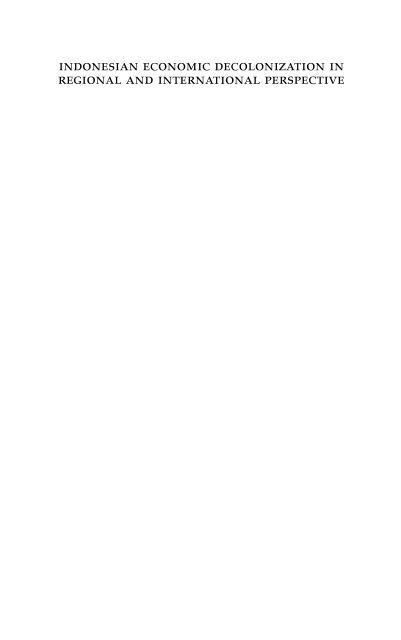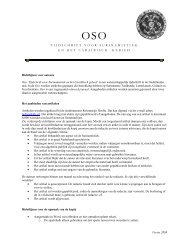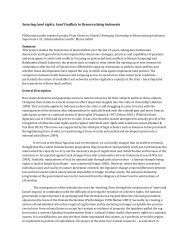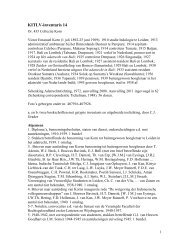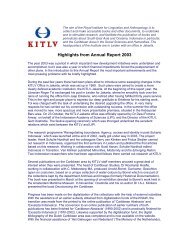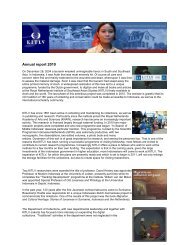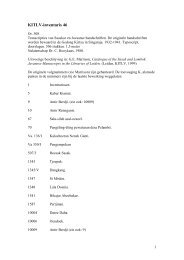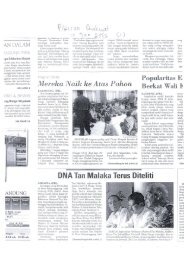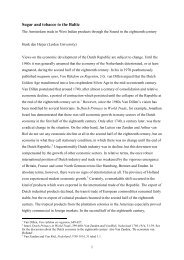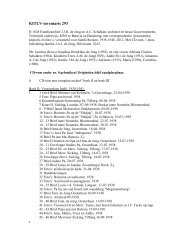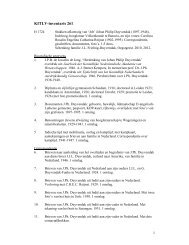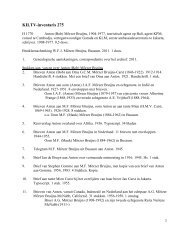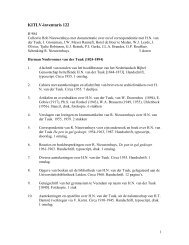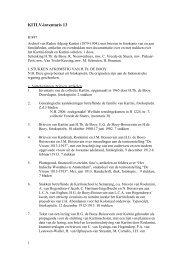indonesian economic decolonization in regional and ... - kitlv
indonesian economic decolonization in regional and ... - kitlv
indonesian economic decolonization in regional and ... - kitlv
You also want an ePaper? Increase the reach of your titles
YUMPU automatically turns print PDFs into web optimized ePapers that Google loves.
<strong><strong>in</strong>donesian</strong> <strong>economic</strong> <strong>decolonization</strong> <strong>in</strong><br />
<strong>regional</strong> <strong>and</strong> <strong>in</strong>ternational perspective
Cover: Advertisement of the Dasaad Mus<strong>in</strong> Concern stress<strong>in</strong>g its role <strong>in</strong> construct<strong>in</strong>g<br />
a new Indonesian economy under the Japanese military adm<strong>in</strong>istration (Djawa Baroe,<br />
15-4-1945; NIOD collection).
VERHANDELINGEN<br />
VAN HET KONINKLIJK INSTITUUT<br />
VOOR TAAL-, LAND- EN VOLKENKUNDE<br />
267<br />
<strong><strong>in</strong>donesian</strong> <strong>economic</strong> <strong>decolonization</strong><br />
<strong>in</strong> <strong>regional</strong> <strong>and</strong><br />
<strong>in</strong>ternational perspective<br />
Edited by<br />
j. thomas l<strong>in</strong>dblad <strong>and</strong> peter post<br />
KITLV Press<br />
Leiden<br />
2009
Published by:<br />
KITLV Press<br />
Kon<strong>in</strong>klijk Instituut voor Taal-, L<strong>and</strong>- en Volkenkunde<br />
(Royal Netherl<strong>and</strong>s Institute of Southeast Asian <strong>and</strong> Caribbean Studies)<br />
P.O. Box 9515<br />
2300 RA Leiden<br />
The Netherl<strong>and</strong>s<br />
website: www.<strong>kitlv</strong>.nl<br />
e-mail: <strong>kitlv</strong>press@<strong>kitlv</strong>.nl<br />
KITLV is an <strong>in</strong>stitute of the Royal Netherl<strong>and</strong>s Academy of Arts <strong>and</strong> Sciences<br />
(KNAW)<br />
Cover: Creja ontwerpen, Leiderdorp<br />
ISBN 978 90 6718 353 6<br />
© 2009 Kon<strong>in</strong>klijk Instituut voor Taal-, L<strong>and</strong>- en Volkenkunde<br />
No part of this publication may be reproduced or transmitted <strong>in</strong> any form or by any<br />
means, electronic or mechanical, <strong>in</strong>clud<strong>in</strong>g photocopy, record<strong>in</strong>g, or any <strong>in</strong>formation<br />
storage <strong>and</strong> retrieval system, without permission from the copyright owner.<br />
Pr<strong>in</strong>ted <strong>in</strong> the Netherl<strong>and</strong>s
Contents<br />
Abbreviations<br />
vii<br />
J. Thomas L<strong>in</strong>dblad <strong>and</strong> Peter Post 1<br />
Indonesian <strong>economic</strong> <strong>decolonization</strong> <strong>in</strong> <strong>regional</strong> <strong>and</strong> <strong>in</strong>ternational perspective<br />
An <strong>in</strong>troduction<br />
The new nation-state 17<br />
Thee Kian Wie 19<br />
Indonesianization<br />
Economic aspects of <strong>decolonization</strong> <strong>in</strong> Indonesia <strong>in</strong> the 1950s<br />
Bambang Purwanto 39<br />
Economic <strong>decolonization</strong> <strong>and</strong> the rise of Indonesian military bus<strong>in</strong>ess<br />
Private bus<strong>in</strong>ess <strong>in</strong> action 59<br />
Peter Post 61<br />
Indonesianisasi <strong>and</strong> Japanization<br />
The Japanese <strong>and</strong> the shift<strong>in</strong>g fortunes of pribumi entrepreneurship<br />
J. Thomas L<strong>in</strong>dblad 87<br />
The economy of <strong>decolonization</strong> <strong>in</strong> North Sumatra<br />
Tri Ch<strong>and</strong>ra Apriyanto 107<br />
Decolonization <strong>in</strong> the Jember estate economy<br />
The <strong>in</strong>ternational comparison 131<br />
Anne Booth 133<br />
Indonesian colonial <strong>economic</strong> performance <strong>in</strong> an East Asian perspective<br />
Daan Marks 157<br />
The <strong>economic</strong> consequences of <strong>decolonization</strong><br />
The ‘special’ case of Indonesia
vi<br />
Contents<br />
Jasper van de Kerkhof 175<br />
‘Colonial’ enterprise <strong>and</strong> the <strong>in</strong>digenization of management <strong>in</strong><br />
<strong>in</strong>dependent Indonesia <strong>and</strong> Malaysia<br />
About the authors 197<br />
Index 199
Abbreviations<br />
ALS<br />
ANRI<br />
AVROS<br />
BANAS<br />
BIN<br />
BKR<br />
BKSBM<br />
BNI<br />
BPM<br />
BPRI<br />
BTC<br />
BTI<br />
BTM<br />
CAO<br />
CMD<br />
CO<br />
CRO<br />
CTc<br />
DJB<br />
DMC<br />
DOAZ<br />
F<strong>in</strong>ec<br />
FPT<br />
GAPPERSU<br />
GAPPIS<br />
GDp<br />
GMB<br />
GTI<br />
HVA<br />
ISK<br />
KHT<br />
KJCPL<br />
KNIP<br />
KNILM<br />
KPM<br />
LAAPLN<br />
Algemeen L<strong>and</strong>bouw Syndicaat<br />
Arsip Nasional Republik Indonesia<br />
Algemeene Vereenig<strong>in</strong>g van Rubberplanters ter Oostkust van<br />
Sumatra<br />
Badan Nasional<br />
Bank Industri Negara<br />
Badan Keamanan Rakjat<br />
Badan Kerdjasama Buruh dan Militer<br />
Bank Negara Indonesia<br />
Bataafsche Petroleum Maatschappij<br />
Badan Pemberontak Republik Indonesia<br />
Bank<strong>in</strong>g <strong>and</strong> Trad<strong>in</strong>g Company<br />
Barisan Tani Indonesia<br />
Besoeki Tabak Maatschappij<br />
collectieve Arbeids Overeenkomst<br />
cultuur-Maatschappij Djelboek<br />
colonial Office<br />
commissie voor Rechtsverkeer <strong>in</strong> Oorlogstijd<br />
central Trad<strong>in</strong>g Corporation<br />
De Javasche Bank<br />
Dasaad Mus<strong>in</strong> Concern<br />
Departement van Oost-Aziatische Zaken<br />
F<strong>in</strong>ancieele en Economische Overeenkomst<br />
Front Persatuan Tani<br />
Gabungan Pengusaha Perkebunan Sumatera Utara<br />
Gabungan Pemberontak Indonesia Soppeng<br />
gross Domestic Product<br />
gemeenschappelijke Mijnbouwmaatschappijen Billiton<br />
gerakan Tani Indonesia<br />
H<strong>and</strong>els Vereenig<strong>in</strong>g ‘Amsterdam’<br />
Ishihara Sangyo Kaisha<br />
Kwik Hoo Tong<br />
Kon<strong>in</strong>klijke Java-Ch<strong>in</strong>a Paketvaart-Lijnen<br />
Komite Nasional Indonesia Pusat<br />
Kon<strong>in</strong>klijke Nederl<strong>and</strong>sch-Indische Luchtvaart-Maatschappij<br />
Kon<strong>in</strong>klijke Paketvaart Maatschappij<br />
Lembaga Alat-Alat Pembajaran Luar Negri
viii<br />
Abbreviations<br />
LAPRIS<br />
LMOD<br />
MCA<br />
mcp<br />
MIA<br />
MITI<br />
MoU<br />
NDP<br />
NEP<br />
NHM<br />
NICA<br />
NISA<br />
NDP<br />
OKB<br />
ORI<br />
ORIPS<br />
ORNI<br />
PAJ<br />
PAY<br />
PBI<br />
PELNI<br />
PERBOEMI<br />
PERMIRI<br />
PKI<br />
PNI<br />
PPKI<br />
PPN<br />
PSI<br />
pp<br />
PSSI<br />
PTE<br />
PTEBI<br />
PTMNRI<br />
RI<br />
RCMA<br />
RIS<br />
RTC<br />
RTI<br />
SAKTI<br />
Sarbupri<br />
SBG<br />
SBII<br />
SBTC<br />
SCAP<br />
SK<br />
SOB<br />
SOBSI<br />
Socf<strong>in</strong><br />
Laskar Pemberontak Republik Indonesia Sulawesi Selatan<br />
L<strong>and</strong>bouw-Maatschappij Oud-Djember<br />
malay(si)an Ch<strong>in</strong>ese Association<br />
malayan Communist Party<br />
malay(si)an Indian Association<br />
m<strong>in</strong>istry of International Trade <strong>and</strong> Industry<br />
memor<strong>and</strong>um of Underst<strong>and</strong><strong>in</strong>g<br />
Net Domestic Product<br />
New Economic Policy<br />
Nederl<strong>and</strong>sche H<strong>and</strong>el-Maatschappij<br />
Netherl<strong>and</strong>s Indies Civil Adm<strong>in</strong>istration<br />
Netherl<strong>and</strong>s Indonesian Supply Agency<br />
Net Domestic Product<br />
Orang Kaja Baru<br />
Oeang Republik Indonesia<br />
Oeang Republik Indonesia Prop<strong>in</strong>si Sumatera<br />
Ondernemersraad voor Nederl<strong>and</strong>s-Indië/Indonesië<br />
panitia Agraria Jakarta (Djakarta)<br />
panitia Agraria Yogyakarta (Jogjakarta)<br />
persatoean Bangsa Indonesia<br />
Pelajaran Nasional Indonesia<br />
Persatoean Boeroeh M<strong>in</strong>jak Indonesia<br />
Perusahaan M<strong>in</strong>jak Republik Indonesia<br />
partai Komunis Indonesia<br />
partai Nasional Indonesia<br />
panitia Persiapan Kemerdekaan Indonesia<br />
pusat Perkebunan Negara<br />
partai Sosialis Indonesia<br />
peraturan Pemer<strong>in</strong>tah<br />
perserikatan Saudagar-Saudagar Indonesia<br />
poesat Tenaga Ekonomi<br />
Persatoean Tenaga Ekonomi Bangsa Indonesia<br />
Perusahaan Tambang M<strong>in</strong>jak Negara Republik Indonesia<br />
Republik Indonesia<br />
Rubber Cultuur-Maatschappij ‘Amsterdam’<br />
Republik Indonesia Serikat<br />
Round Table Conference<br />
Rukun Tani Indonesia<br />
Sarekat Kaum Tani Indonesia<br />
Sarekat Buruh Perkebunan Republik Indonesia<br />
Serikat Buruh Gula<br />
Sarekat Buruh Islam Indonesia<br />
Sumatra Bank<strong>in</strong>g <strong>and</strong> Trad<strong>in</strong>g Corporation<br />
Supreme Comm<strong>and</strong> of the Allied Powers<br />
Surat Keputusan<br />
Staat van Oorlog en Beleg<br />
Sentral Organisasi Buruh Seluruh Indonesia<br />
Société F<strong>in</strong>ancière
Abbreviations<br />
ix<br />
SOEIMEX<br />
SPA<br />
STII<br />
SUMUT<br />
TKR<br />
TMSU<br />
TNI<br />
TRI<br />
UMNO<br />
VOC<br />
Soematera Import <strong>and</strong> Export<br />
Sumatra Planters’ Association<br />
Sarekat Tani Islam Indonesia<br />
Sumatera Utara<br />
Tentara Keamanan Rakjat<br />
Tambang M<strong>in</strong>jak Sumatera Utara<br />
Tentara Nasional Indonesia<br />
Tentara Rakjat Indonesia<br />
United Malays National Organization<br />
Vereenigde Oost-Indische Compagnie
J. Thomas L<strong>in</strong>dblad <strong>and</strong> Peter Post<br />
Indonesian <strong>economic</strong> <strong>decolonization</strong> <strong>in</strong><br />
<strong>regional</strong> <strong>and</strong> <strong>in</strong>ternational perspective<br />
An <strong>in</strong>troduction<br />
The <strong>decolonization</strong> of Asia <strong>and</strong> Africa <strong>in</strong> the mid-twentieth century was a<br />
watershed <strong>in</strong> recent world history. After decades of formal <strong>and</strong> <strong>in</strong>formal<br />
<strong>in</strong>tegration <strong>in</strong> the Western <strong>and</strong> Japanese empires the subord<strong>in</strong>ation of the<br />
peoples of both cont<strong>in</strong>ents came to an end <strong>and</strong> <strong>in</strong> a relatively short period,<br />
the new nation-states became <strong>in</strong>dependent players <strong>in</strong> the global political<br />
arena. Free<strong>in</strong>g themselves from the yoke of Western imperialism sometimes<br />
led to bitter struggles for Independence, as <strong>in</strong> Algeria, French Indoch<strong>in</strong>a <strong>and</strong><br />
Indonesia. Elsewhere, the process of <strong>decolonization</strong> went relatively smoothly,<br />
for example <strong>in</strong> India <strong>and</strong> the Philipp<strong>in</strong>es. However, achiev<strong>in</strong>g political <strong>in</strong>dependence<br />
<strong>and</strong> obta<strong>in</strong><strong>in</strong>g adm<strong>in</strong>istrative <strong>and</strong> judicial control over one’s territory<br />
did not automatically mean ga<strong>in</strong><strong>in</strong>g control over <strong>economic</strong> <strong>in</strong>stitutions<br />
<strong>and</strong> the <strong>economic</strong> assets of the former coloniz<strong>in</strong>g power. Economic <strong>decolonization</strong><br />
generally lagged beh<strong>in</strong>d political <strong>decolonization</strong>.<br />
In the historiography on <strong>decolonization</strong>, <strong>economic</strong> aspects are on occasion<br />
mentioned but tend to rema<strong>in</strong> subord<strong>in</strong>ated to politics. Much of the literature<br />
assumes a political perspective <strong>and</strong> is concerned with questions of power <strong>and</strong><br />
authority <strong>and</strong> military issues as well as the relationship of <strong>decolonization</strong> to<br />
the Cold War. The lack of <strong>in</strong>terest <strong>in</strong> the <strong>economic</strong> side of the process may<br />
come as a surprise given the fact that <strong>economic</strong> exploitation had formed one<br />
of the major reasons beh<strong>in</strong>d colonial expansion, <strong>and</strong> that <strong>in</strong> build<strong>in</strong>g up their<br />
national economies the newly sovereign nations badly needed the <strong>in</strong>stitutions,<br />
capital, know-how <strong>and</strong> management capabilities that <strong>in</strong> the past had<br />
been supplied by the colonizer.<br />
Most former colonies were strik<strong>in</strong>gly ill-prepared to manage a modern<br />
bank<strong>in</strong>g system, a smooth work<strong>in</strong>g <strong>in</strong>dustrial <strong>and</strong> trad<strong>in</strong>g sector <strong>and</strong> an<br />
export-oriented estate agriculture. Indonesia is a case <strong>in</strong> po<strong>in</strong>t. When Sukarno<br />
<strong>and</strong> Moh. Hatta declared Indonesia <strong>in</strong>dependent <strong>in</strong> 1945 <strong>and</strong> when the<br />
Netherl<strong>and</strong>s <strong>in</strong> 1949 formally acknowledged Indonesian sovereignty, hopes
2<br />
J. Thomas L<strong>in</strong>dblad <strong>and</strong> Peter Post<br />
ran high. But it soon turned out that the transformation of the colonial economy<br />
<strong>in</strong>to a national economy was exceptionally difficult. Economic <strong>decolonization</strong><br />
thus acquired a momentum <strong>and</strong> a chronology of its own. This book is<br />
about that process. It has a double aim: to identify the unique characteristics<br />
of <strong>economic</strong> <strong>decolonization</strong> <strong>in</strong> Indonesia, as opposed to political <strong>decolonization</strong>,<br />
<strong>and</strong> to f<strong>in</strong>d out to what extent <strong>economic</strong> <strong>decolonization</strong> <strong>in</strong> Indonesia<br />
differed from similar processes elsewhere <strong>in</strong> Asia.<br />
There were two types of challenges simultaneously confront<strong>in</strong>g the newly<br />
<strong>in</strong>dependent nation-state <strong>in</strong> Indonesia as well as other former colonies.<br />
Highest priority was given to the construction of a substantive national<br />
economy but precisely at that time, the post-war resurgence of world trade<br />
opened up generous opportunities for further <strong>in</strong>tegration <strong>in</strong>to the wider<br />
global economy. The two trajectories were only partially compatible with one<br />
another. Ga<strong>in</strong><strong>in</strong>g control over <strong>economic</strong> assets obviously meant a reduction<br />
of the role played by private capital from the former colonial power <strong>in</strong> the<br />
domestic economy, but cooperation with such firms was essential <strong>in</strong> order to<br />
reap full benefits from participat<strong>in</strong>g <strong>in</strong> the worldwide boom.<br />
Generally speak<strong>in</strong>g, three preconditions had to be fulfilled for a successful<br />
<strong>in</strong>tegration <strong>in</strong>to the global economy. First, a well-<strong>in</strong>formed, enterpris<strong>in</strong>g<br />
<strong>and</strong> well-connected private bus<strong>in</strong>ess sector was needed. Second, a capable<br />
<strong>economic</strong> adm<strong>in</strong>istrative apparatus had to be <strong>in</strong> place. Third, access had to<br />
be guaranteed to the capital, know-how <strong>and</strong> management capabilities which<br />
private firms from the former colonial power could most easily provide.<br />
Meet<strong>in</strong>g these preconditions was no easy task <strong>in</strong> the first place, but it became<br />
all the more complicated as it co<strong>in</strong>cided with the emancipation from colonialism<br />
<strong>in</strong> <strong>economic</strong> life.<br />
‘The Revolution has yet to beg<strong>in</strong> <strong>in</strong> the economy.’ This say<strong>in</strong>g is attributed<br />
to the nationalist leader, later Cab<strong>in</strong>et M<strong>in</strong>ister Agus Salim at the time of the<br />
Indonesian Revolution <strong>in</strong> the second half of the 1940s (Higg<strong>in</strong>s 1957:102).<br />
By the time of the transfer of sovereignty <strong>in</strong> December 1949, large proportions<br />
of the modern sectors of the economy <strong>in</strong> Indonesia, about one-quarter<br />
of the total, were still controlled by private Dutch capital. This <strong>in</strong>cluded<br />
estate agriculture, m<strong>in</strong><strong>in</strong>g, manufactur<strong>in</strong>g, <strong>in</strong>terisl<strong>and</strong> shipp<strong>in</strong>g, <strong>in</strong>ternational<br />
trad<strong>in</strong>g <strong>and</strong> bank<strong>in</strong>g. Eight Dutch trad<strong>in</strong>g-firms h<strong>and</strong>led 60 per cent<br />
of exports, whereas the ubiquitous ‘Big Five’ (Borsumij, Internatio, Jacobson<br />
van den Berg, L<strong>in</strong>deteves <strong>and</strong> Geo. Wehry) predom<strong>in</strong>ated <strong>in</strong> the import<br />
trade (Glassburner 1971:79; Dick et al. 2002:174). Economic <strong>decolonization</strong> <strong>in</strong><br />
Indonesia arguably only came to a conclusion <strong>in</strong> 1959 when the Dutch enterprises,<br />
which had been taken over <strong>in</strong> December 1957 <strong>and</strong> early 1958, were<br />
nationalized. In other words, <strong>in</strong> Indonesia <strong>economic</strong> <strong>decolonization</strong> lagged<br />
beh<strong>in</strong>d political <strong>decolonization</strong> by at least fourteen years.<br />
The eight contributions to this volume are selected <strong>in</strong> such a way as to
Indonesian <strong>economic</strong> <strong>decolonization</strong> <strong>in</strong> <strong>regional</strong> <strong>and</strong> <strong>in</strong>ternational perspective 3<br />
obta<strong>in</strong> a broad <strong>and</strong> multi-facetted outlook on the premise that <strong>economic</strong><br />
<strong>decolonization</strong> <strong>in</strong> Indonesia cannot be understood from one s<strong>in</strong>gle viewpo<strong>in</strong>t<br />
alone. The various contributions are arranged accord<strong>in</strong>g to three perspectives<br />
complement<strong>in</strong>g each other: the new nation-state, private bus<strong>in</strong>ess <strong>and</strong><br />
the <strong>in</strong>ternational comparison. Each warrants a separate commentary, also<br />
<strong>in</strong>corporat<strong>in</strong>g some of the major f<strong>in</strong>d<strong>in</strong>gs of the <strong>in</strong>dividual contributions. The<br />
volume as a whole forms a complement to a recent monograph outl<strong>in</strong><strong>in</strong>g the<br />
history of <strong>economic</strong> <strong>decolonization</strong> <strong>in</strong> Indonesia (L<strong>in</strong>dblad 2008).<br />
The new nation-state<br />
The Indonesian nationalist leaders gave strik<strong>in</strong>gly little attention to <strong>economic</strong><br />
issues <strong>in</strong> their writ<strong>in</strong>gs preced<strong>in</strong>g Independence. Only at the time of the<br />
transfer of sovereignty did a slender book appear with the expression ‘from a<br />
colonial to a national economy’ (dari ekonomi kolonial ke ekonomi nasional) <strong>in</strong> its<br />
very title (Soejono Had<strong>in</strong>oto 1949). Yet this booklet did not conta<strong>in</strong> a precise<br />
def<strong>in</strong>ition of what was meant by a ‘national economy’; rather, it expressed a<br />
preference for <strong>economic</strong> policy-mak<strong>in</strong>g along the l<strong>in</strong>es of social democracy.<br />
For a fuller underst<strong>and</strong><strong>in</strong>g of this concept, we need to l<strong>in</strong>k it to the idea of the<br />
new nation-state <strong>and</strong> <strong>economic</strong> nationalism develop<strong>in</strong>g <strong>in</strong> its wake.<br />
The concept of a ‘national economy’ is <strong>in</strong>extricably bound up with the<br />
notion of the nation-state, which <strong>in</strong> its modern version came to feel the<br />
need ‘to def<strong>in</strong>e the <strong>economic</strong> space over which it claimed control’ (Dick et<br />
al. 2002:10). Although it can be argued that a national economy from the<br />
po<strong>in</strong>t of view of effective control was only substantiated much later, dur<strong>in</strong>g<br />
the New Order government, it is clear that this became a major target for<br />
the Indonesian government follow<strong>in</strong>g the transfer of sovereignty. There is a<br />
discussion <strong>in</strong> the older literature about the chang<strong>in</strong>g character of the successive<br />
cab<strong>in</strong>ets <strong>in</strong> the 1950s. The American political scientist John Sutter dist<strong>in</strong>guishes<br />
between two periods. The first one is the pragmatic <strong>and</strong> moderate<br />
‘Masjumi period’ (after the lead<strong>in</strong>g Islamic party), which ran from 1949 to<br />
1953 <strong>and</strong> covered four cab<strong>in</strong>ets (Hatta, Natsir, Sukiman, Wilopo). The latter<br />
period is described as the ‘PNI period’ (after Partai Nasional Indonesia,<br />
Indonesian National Party), conta<strong>in</strong><strong>in</strong>g the three cab<strong>in</strong>ets between 1953 <strong>and</strong><br />
1957 (Ali Sastroamidjojo I <strong>and</strong> II, Harahap) <strong>and</strong> dom<strong>in</strong>ated by ‘less tolerant<br />
ultranationalist politicians’ (Sutter 1959:1190). Benjam<strong>in</strong> Higg<strong>in</strong>s suggests a<br />
different term<strong>in</strong>ology, contrast<strong>in</strong>g the Western-oriented ‘<strong>economic</strong>s-m<strong>in</strong>ded’<br />
cab<strong>in</strong>ets of the period 1949-1953 with the socialist-<strong>in</strong>spired ‘developmentm<strong>in</strong>ded’<br />
cab<strong>in</strong>ets of the years 1953-1957 (Higg<strong>in</strong>s 1957:103). Regardless of<br />
the term<strong>in</strong>ology applied, this change <strong>in</strong> ideological outlook had important<br />
repercussions for how <strong>economic</strong> <strong>decolonization</strong> took shape <strong>in</strong> Indonesia, as is
4<br />
J. Thomas L<strong>in</strong>dblad <strong>and</strong> Peter Post<br />
documented <strong>in</strong> Thee Kian Wie’s open<strong>in</strong>g account of <strong>economic</strong> policy-mak<strong>in</strong>g<br />
dur<strong>in</strong>g the 1950s.<br />
Thee provides an overview of the most important policy measures <strong>in</strong> the<br />
1950s aim<strong>in</strong>g at the transformation from a colonial <strong>in</strong>to a national economy.<br />
The logical po<strong>in</strong>t of departure is the F<strong>in</strong>ec (F<strong>in</strong>ancieele en Economische<br />
Overeenkomst, F<strong>in</strong>ancial <strong>and</strong> Economic Agreement), attached to the Round<br />
Table Conference (RTC) Agreement, which <strong>in</strong> November 1949 laid down the<br />
conditions under which the Dutch government was prepared to acknowledge<br />
Indonesia’s Independence. These provisions severely curtailed the scope for<br />
<strong>economic</strong> policy-mak<strong>in</strong>g <strong>and</strong> were deeply resented by the Indonesian delegation<br />
attend<strong>in</strong>g the conference. Dutch refusal to surrender the western part of<br />
New Gu<strong>in</strong>ea (later Irian Jaya, now Papua) <strong>and</strong> the provisions guarantee<strong>in</strong>g<br />
unh<strong>in</strong>dered operations by Dutch firms provoked the most discontent on the<br />
Indonesian side. This cont<strong>in</strong>ued to exert a negative impact on the transfer of<br />
Dutch-owned assets <strong>in</strong>to Indonesian h<strong>and</strong>s.<br />
Pragmatic politicians like Vice President Hatta, president of the central bank<br />
Sjafrudd<strong>in</strong> Prawiranegara <strong>and</strong> Cab<strong>in</strong>et M<strong>in</strong>isters Sumitro Djojohadikusumo<br />
<strong>and</strong> Dju<strong>and</strong>a realized that top priority had to be given to <strong>economic</strong> stabilization<br />
<strong>and</strong> rehabilitation <strong>and</strong> were will<strong>in</strong>g to make compromises. Nevertheless,<br />
various measures were taken to curb Dutch <strong>economic</strong> control. Early nationalization<br />
with f<strong>in</strong>ancial compensation affected the central bank, the national<br />
carrier, public transport (railways) <strong>and</strong> public utilities (gas <strong>and</strong> electricity). It<br />
can be argued that the moderate cab<strong>in</strong>ets of the so-called ‘Masjumi’ period<br />
achieved more by peaceful means <strong>and</strong> negotiations than the later, more<br />
aggressive cab<strong>in</strong>ets.<br />
Economic nationalism was on the rise <strong>in</strong> the 1950s, not only <strong>in</strong> Indonesia<br />
but also <strong>in</strong> other former colonies. It is commonly def<strong>in</strong>ed as ‘the national<br />
aspiration to hav<strong>in</strong>g property owned by nationals <strong>and</strong> <strong>economic</strong> functions<br />
performed by nationals’ (Johnson 1972:26). This target was to be achieved<br />
through the so-called Benteng programme, best described as a policy of positive<br />
discrim<strong>in</strong>ation favour<strong>in</strong>g Indonesian nationals to counter the predom<strong>in</strong>ance<br />
of private Dutch firms <strong>in</strong> trad<strong>in</strong>g. As Thee argues, the programme had<br />
the auxiliary aim of reduc<strong>in</strong>g the role of ethnic Ch<strong>in</strong>ese <strong>in</strong> the Indonesian<br />
economy. Ch<strong>in</strong>ese dom<strong>in</strong>ance of important sectors of the economy had<br />
caused much resentment among the <strong>in</strong>digenous population <strong>and</strong> <strong>in</strong> the late<br />
1950s several measures were taken to transfer some of these sectors to the<br />
<strong>in</strong>digenous bus<strong>in</strong>ess class. However, most of these measures caused considerable<br />
<strong>economic</strong> disruption, <strong>and</strong> although many ethnic Ch<strong>in</strong>ese bus<strong>in</strong>essmen<br />
experienced great difficulties dur<strong>in</strong>g the 1950s, their <strong>economic</strong> position was<br />
not seriously weakened.<br />
The ultimate act of <strong>economic</strong> nationalism was the takeover <strong>and</strong> nationalization<br />
of virtually all rema<strong>in</strong><strong>in</strong>g private Dutch firms <strong>in</strong> the late 1950s.
Indonesian <strong>economic</strong> <strong>decolonization</strong> <strong>in</strong> <strong>regional</strong> <strong>and</strong> <strong>in</strong>ternational perspective 5<br />
Significantly, the concept of a ‘national economy’ was only shortly afterwards<br />
officially l<strong>in</strong>ked to Indonesian national identity. In his annual report about<br />
1959, the central bank president wrote: ‘An Indonesian economy can only be<br />
truly called “national” if based on the Indonesian spiritual <strong>and</strong> material identity’<br />
(Bank Indonesia 1960:2). Such a statement served as legitimization of the<br />
nationalization of Dutch firms only one year before, possibly also <strong>in</strong> defence<br />
of the far-reach<strong>in</strong>g discrim<strong>in</strong>atory measures taken aga<strong>in</strong>st ethnic Ch<strong>in</strong>ese<br />
merely months earlier.<br />
Nationalist sentiments were <strong>in</strong>creas<strong>in</strong>gly <strong>in</strong>term<strong>in</strong>gled with the political<br />
ideologies of the Cold War. There was traditionally a tendency among lead<strong>in</strong>g<br />
Indonesian economists to favour co-operatives <strong>and</strong> active participation<br />
by the state <strong>in</strong> <strong>economic</strong> life above unrestra<strong>in</strong>ed scope for private capital. The<br />
populace’s trust <strong>in</strong> private entrepreneurship was severely damaged when<br />
the Benteng programme became a public sc<strong>and</strong>al <strong>in</strong> the mid-1950s. The role<br />
of the state as a major player <strong>in</strong> the economy was greatly enhanced when<br />
the Dutch firms were formally nationalized <strong>and</strong> became the property of the<br />
Indonesian nation. This was re<strong>in</strong>forced by Sukarno’s <strong>in</strong>troduction of the doctr<strong>in</strong>es<br />
‘Guided Economy’ <strong>and</strong> ‘socialism à la Indonesia’ <strong>in</strong> 1958-1960, which<br />
met with strik<strong>in</strong>gly little dissent from lead<strong>in</strong>g Indonesian economists (Mackie<br />
1971:51). The <strong>economic</strong> system envisaged <strong>in</strong> the new nation-state <strong>in</strong> the late<br />
1950s <strong>and</strong> early 1960s was one <strong>in</strong> which the ‘people’s welfare’ was the core<br />
pr<strong>in</strong>ciple, an aim which, accord<strong>in</strong>g to accepted ideology at the time, was not<br />
to be achieved by the system of private capitalism that the one-time colonial<br />
masters had bequeathed to Indonesia (Robison 1986:37-8).<br />
A uniquely Indonesian feature of the nation-state <strong>in</strong> an entrepreneurial<br />
capacity was the heavy <strong>in</strong>volvement of the military <strong>in</strong> <strong>economic</strong> life. Different<br />
from previous writers, Bambang Purwanto traces the orig<strong>in</strong>s of military-controlled<br />
bus<strong>in</strong>ess right to the very beg<strong>in</strong>n<strong>in</strong>g of the Indonesian Revolution <strong>in</strong><br />
1945. He argues that the l<strong>in</strong>k between <strong>economic</strong> <strong>decolonization</strong> <strong>and</strong> <strong>in</strong>creas<strong>in</strong>g<br />
military bus<strong>in</strong>ess was established <strong>in</strong> the late 1940s <strong>and</strong> successively<br />
strengthened <strong>in</strong> the course of the 1950s. Decolonization placed the military<br />
<strong>in</strong> a key position that was re<strong>in</strong>forced by the apparent <strong>in</strong>ability of the civilian<br />
government to manage the nation’s <strong>economic</strong> resources. This nurtured the<br />
<strong>in</strong>terest of soldiers <strong>and</strong> officers <strong>in</strong> conduct<strong>in</strong>g bus<strong>in</strong>ess, both as a group <strong>and</strong><br />
as <strong>in</strong>dividuals. By the late 1950s, military officers had slotted themselves <strong>in</strong>to<br />
a dependence on bus<strong>in</strong>ess activities. They were reap<strong>in</strong>g large profits, not only<br />
<strong>economic</strong>ally, but also socially <strong>and</strong> politically. As an <strong>in</strong>stitution, the army <strong>in</strong><br />
particular grew dependent on f<strong>in</strong>ancial proceeds from its bus<strong>in</strong>ess deals. By<br />
the time that <strong>economic</strong> <strong>decolonization</strong> was near<strong>in</strong>g its end, conduct<strong>in</strong>g bus<strong>in</strong>ess<br />
<strong>and</strong> be<strong>in</strong>g <strong>in</strong> the military had become two sides of the same co<strong>in</strong>.
6<br />
J. Thomas L<strong>in</strong>dblad <strong>and</strong> Peter Post<br />
Private bus<strong>in</strong>ess <strong>in</strong> action<br />
Economic nationalism prescribed private <strong>economic</strong> activities to be conducted<br />
first <strong>and</strong> foremost by Indonesian nationals, which obviously represented a<br />
radical departure from the colonial economy with top positions reserved<br />
for Dutchmen. A key analytical tool to further our underst<strong>and</strong><strong>in</strong>g of <strong>economic</strong><br />
<strong>decolonization</strong> <strong>in</strong> Indonesia, therefore, is the concept of Indonesianisasi<br />
(‘Indonesianization’). This term was <strong>in</strong>troduced <strong>in</strong>to the academic literature<br />
by John Sutter <strong>in</strong> the late 1950s <strong>and</strong> def<strong>in</strong>ed as ‘a conscious effort to<br />
<strong>in</strong>crease the participation <strong>and</strong> elevate the role of the Indonesian – <strong>and</strong> more<br />
particularly the “<strong>in</strong>digenous” Indonesian – <strong>in</strong> the more complex sectors of<br />
the economy’ (Sutter 1959:2; L<strong>in</strong>dblad 2002:52). This effort could assume<br />
many shapes, rang<strong>in</strong>g from promotion of Indonesians <strong>in</strong>to supervisory <strong>and</strong><br />
management positions <strong>in</strong> private companies, to full-scale appropriation <strong>and</strong><br />
nationalization of foreign-owned firms. Sutter <strong>and</strong> other contemporary writers<br />
viewed Indonesianisasi as a process of emancipation. Indonesians were<br />
to be liberated from Western, <strong>in</strong> particular Dutch, control of vital sectors of<br />
the economy. The F<strong>in</strong>ec Agreement <strong>in</strong> 1949 <strong>in</strong>cluded a loose commitment by<br />
rema<strong>in</strong><strong>in</strong>g Dutch enterprises to <strong>in</strong>crease participation of Indonesians <strong>in</strong> higher<br />
staff functions <strong>and</strong> eventually replace Dutchmen by Indonesian nationals.<br />
Throughout the 1950s, Indonesianisasi figured prom<strong>in</strong>ently <strong>in</strong> the public<br />
discourse about how to ga<strong>in</strong> control over the nation’s <strong>economic</strong> resources <strong>and</strong><br />
achieve <strong>economic</strong> <strong>decolonization</strong>.<br />
Indonesianisasi had a strong ideological component. It can be argued that<br />
it first emerged as an important driv<strong>in</strong>g force of Indonesian nationalism with<br />
the establishment of the Sarekat Islam <strong>in</strong> 1912, the first mass organization of<br />
the Indonesian nationalist movement. In the late 1920s, it ga<strong>in</strong>ed momentum<br />
with the establishment of the B<strong>and</strong>oeng Studieclub (B<strong>and</strong>ung Study Club)<br />
<strong>and</strong> the Persatoean Bangsa Indonesia, PBI (Indonesian People’s Association)<br />
of Dr Sutomo. By the second half of the 1930s, Indonesianisasi had evolved as<br />
an essential part of the ‘nationalist struggle’ for Independence. Initially, it was<br />
part of a movement aim<strong>in</strong>g at a wider <strong>in</strong>digenous <strong>economic</strong> participation <strong>in</strong><br />
the exist<strong>in</strong>g Dutch colonial economy, but later it was <strong>in</strong>creas<strong>in</strong>gly <strong>in</strong>fluenced<br />
by a more global discussion about the failure of Western capitalism to suit<br />
the needs of <strong>economic</strong> development <strong>in</strong> Indonesia. Its outlook became more<br />
socialist <strong>and</strong> anti-capitalist.<br />
Indonesianisasi also had an ethnic aspect. To many Indonesians it meant<br />
emancipation, not only from Dutch, but also from Ch<strong>in</strong>ese control of the<br />
economy. In particular this applied to control as exercised by ethnic Ch<strong>in</strong>ese<br />
(usually peranakan groups with roots <strong>in</strong> Indonesia), who ma<strong>in</strong>ta<strong>in</strong>ed close<br />
relations with Dutch capital <strong>and</strong> were often seen as figureheads of Dutch<br />
capitalism. This became a highly complex matter <strong>in</strong> the 1950s, when officially
Indonesian <strong>economic</strong> <strong>decolonization</strong> <strong>in</strong> <strong>regional</strong> <strong>and</strong> <strong>in</strong>ternational perspective 7<br />
sanctioned discrim<strong>in</strong>ation of non-nationals could be construed as discrim<strong>in</strong>ation<br />
aga<strong>in</strong>st those ethnic Ch<strong>in</strong>ese who had not unambiguously opted for<br />
Indonesian citizenship. The quest for Indonesianisasi offered opportunities<br />
for overt expressions of anti-Ch<strong>in</strong>ese sentiments, as demonstrated by the<br />
Assaat movement <strong>in</strong> 1956 <strong>and</strong> the <strong>in</strong>famous PP 10 (Peraturan Pemer<strong>in</strong>tah,<br />
Government Regulation) <strong>in</strong> 1959, which barred ethnic Ch<strong>in</strong>ese from trad<strong>in</strong>g<br />
<strong>in</strong> the countryside. Some historians, <strong>in</strong>clud<strong>in</strong>g Bambang Purwanto <strong>in</strong> this volume,<br />
therefore tend to equate Indonesianisasi with pribumisasi (from pribumi,<br />
‘<strong>in</strong>digenous’).<br />
Indonesianisasi or pribumisasi was not conf<strong>in</strong>ed to the post-Independence<br />
period. In his contribution to this volume, Peter Post po<strong>in</strong>ts out that <strong>economic</strong><br />
<strong>decolonization</strong> started already <strong>in</strong> the late 1920s, when Japanese <strong>in</strong>vestment<br />
began to enter the Netherl<strong>and</strong>s Indies. A Japan-oriented niche was created <strong>in</strong><br />
the colonial economy that brought pribumi bus<strong>in</strong>ess groups <strong>in</strong> direct contact<br />
with Japanese <strong>in</strong>dustrial capital. Us<strong>in</strong>g the example of one lead<strong>in</strong>g pribumi<br />
entrepreneur of the time, Agoes Moes<strong>in</strong> Dasaad, Post demonstrates that private<br />
<strong>in</strong>digenous bus<strong>in</strong>ess <strong>in</strong>terests managed to <strong>in</strong>fluence <strong>economic</strong> policies to<br />
a significant degree dur<strong>in</strong>g the late 1940s <strong>and</strong> 1950s.<br />
The role of Japan <strong>in</strong> Indonesia’s <strong>economic</strong> <strong>decolonization</strong> was twofold.<br />
Japanese private capital offered unique opportunities for <strong>in</strong>digenous entrepreneurship<br />
dur<strong>in</strong>g both the late colonial period <strong>and</strong> the Japanese occupation<br />
(March 1942-August 1945), which went aga<strong>in</strong>st the very foundations<br />
of the Dutch colonial economy. In addition, as Post emphasizes, substantial<br />
f<strong>in</strong>ancial support from the Japanese government to Indonesia materialized<br />
<strong>in</strong> December 1957, precisely at the time when the Dutch enterprises were<br />
taken over by local labour unions. There is still disagreement <strong>in</strong> the <strong>in</strong>ternational<br />
literature whether or not the Sukarno government was <strong>in</strong>volved <strong>in</strong>, or<br />
<strong>in</strong>formed about, the takeovers beforeh<strong>and</strong> (Gardner 1997; A. Kah<strong>in</strong> <strong>and</strong> G.<br />
Kah<strong>in</strong> 1995). In any case, the government must have felt so strengthened by<br />
the simultaneous agreement on Japanese war reparations <strong>and</strong> long-tem loans<br />
that it retroactively legitimized the actions of labour with great speed.<br />
Indonesianisasi implied competition as well as confrontation. Efforts to<br />
promote Indonesian traders at the expense of Dutch (<strong>and</strong> ethnic Ch<strong>in</strong>ese)<br />
rivals by means of positive discrim<strong>in</strong>ation failed dismally. The Indonesian<br />
government’s attempt to wrest control over <strong>in</strong>terisl<strong>and</strong> shipp<strong>in</strong>g from the<br />
fully Dutch-owned KPM (Kon<strong>in</strong>klijke Paketvaart Maatschappij, Royal Packet<br />
Company) met with a similar fate, as is shown by Daan Marks <strong>in</strong> his application<br />
of an <strong>in</strong>ternational comparative perspective. There is, however, evidence<br />
to the effect that <strong>in</strong>digenous Indonesian bus<strong>in</strong>ess did flourish <strong>in</strong> the 1950s,<br />
possibly even despite policies of positive discrim<strong>in</strong>ation (L<strong>in</strong>dblad 2004).<br />
Confrontations <strong>in</strong> private bus<strong>in</strong>ess became especially <strong>in</strong>tense when<br />
the <strong>in</strong>terests of foreign owners clashed with those of labour, locals or the
8<br />
J. Thomas L<strong>in</strong>dblad <strong>and</strong> Peter Post<br />
President Sukarno <strong>and</strong> Haji Agus Salim, M<strong>in</strong>ister of Foreign Affairs, <strong>in</strong> Prapat, North<br />
Sumatra, dur<strong>in</strong>g the second Dutch military action <strong>in</strong> December 1948. At the time of<br />
the transfer of sovereignty, one year later, Agus Salim stated that ‘the Revolution has<br />
yet to beg<strong>in</strong> <strong>in</strong> the economy’. (KITLV 2642.)<br />
Indonesian government, or all three <strong>in</strong> comb<strong>in</strong>ation. We may only learn more<br />
about such confrontations by look<strong>in</strong>g at specific case studies. This may be<br />
done by review<strong>in</strong>g corporate strategies <strong>in</strong> foreign-owned firms <strong>in</strong> different<br />
former colonies, as is suggested by Jasper van de Kerkhof <strong>in</strong> his contribution<br />
to this volume. Another approach is to focus on regions where vested<br />
<strong>in</strong>terests of private Dutch capital were especially strong <strong>and</strong> where we may<br />
expect the transition of management over <strong>economic</strong> resources to proceed <strong>in</strong> a<br />
dramatic fashion. For this purpose, we selected two regions, both prom<strong>in</strong>ent<br />
<strong>in</strong> Indonesian estate agriculture but also widely disparate <strong>in</strong> terms of location:<br />
North Sumatra <strong>and</strong> East Java.<br />
In his survey of <strong>economic</strong> performance <strong>in</strong> North Sumatra before <strong>and</strong><br />
immediately after the takeover of Dutch estates, Thomas L<strong>in</strong>dblad dist<strong>in</strong>guishes<br />
between external <strong>and</strong> <strong>in</strong>ternal factors. Deteriorat<strong>in</strong>g conditions of<br />
production barred the estates from reap<strong>in</strong>g full benefit from the positive<br />
global market prospects already existent <strong>in</strong> the mid-1950s. Difficulties due to<br />
the transfer of management <strong>in</strong> 1958 <strong>in</strong> the wake of the takeovers were aggravated<br />
by a short-term price fall <strong>in</strong> foreign markets. However, production
Indonesian <strong>economic</strong> <strong>decolonization</strong> <strong>in</strong> <strong>regional</strong> <strong>and</strong> <strong>in</strong>ternational perspective 9<br />
capacity was restored after a relatively brief period of adjustment, as may be<br />
demonstrated by highlight<strong>in</strong>g cont<strong>in</strong>uities between the situation just before<br />
<strong>and</strong> just after the takeovers. There was even a strik<strong>in</strong>g similarity between the<br />
periods of Dutch <strong>and</strong> Indonesian management <strong>in</strong> terms of cluster<strong>in</strong>g of the<br />
estates for adm<strong>in</strong>istrative purposes. Such f<strong>in</strong>d<strong>in</strong>gs lead L<strong>in</strong>dblad to conclude<br />
that we should be cautious <strong>in</strong> establish<strong>in</strong>g a direct causal l<strong>in</strong>k between the<br />
transfer of management <strong>in</strong> 1957-1959 <strong>and</strong> the deep <strong>economic</strong> crisis <strong>in</strong> which<br />
Indonesia found itself <strong>in</strong> the mid-1960s, an op<strong>in</strong>ion which is not shared by<br />
all observers.<br />
Tri Ch<strong>and</strong>ra Apriyanto takes a close look at the <strong>economic</strong> <strong>decolonization</strong><br />
<strong>and</strong> nationalization of the sugar <strong>and</strong> tobacco plantations <strong>in</strong> the East Java<br />
region of Jember (Besuki). He traces the ideological roots of the public debate<br />
on estate agriculture dur<strong>in</strong>g the Indonesian Revolution to nationalist writ<strong>in</strong>gs<br />
preced<strong>in</strong>g Independence. The debate was not only about future social<br />
<strong>and</strong> political developments, but primarily about political substance <strong>and</strong> its<br />
ideological foundation. The contrast between official government-held views<br />
<strong>and</strong> strategies pursued by peasant mass organizations illustrates the dilemmas<br />
confront<strong>in</strong>g the Indonesian Republic <strong>in</strong> the late 1940s <strong>and</strong> throughout<br />
the 1950s. The guarantees given to Dutch estate firms stood <strong>in</strong> stark contrast<br />
to the dem<strong>and</strong>s for a full control over l<strong>and</strong> <strong>and</strong> labour voiced by peasant<br />
organizations. The <strong>in</strong>tensity of conflict is illustrated by the dramatic events<br />
surround<strong>in</strong>g the transfer of management of the estates <strong>in</strong> Jember <strong>in</strong> late 1957<br />
<strong>and</strong> early 1958.<br />
There was a relatively long <strong>in</strong>terval between the takeovers <strong>and</strong> nationalization<br />
of Dutch firms such as the estates <strong>in</strong> North Sumatra <strong>and</strong> East Java,<br />
a time span commenc<strong>in</strong>g <strong>in</strong> December 1957 <strong>and</strong> reach<strong>in</strong>g far <strong>in</strong>to 1959. Can<br />
this time span be construed as an <strong>in</strong>dication that nationalization had not yet<br />
become the ultimate aim at the time of the takeovers? The takeovers <strong>in</strong>itially<br />
served only to exert pressure on the Netherl<strong>and</strong>s <strong>in</strong> the rampant conflict over<br />
western New Gu<strong>in</strong>ea, as was <strong>in</strong>deed repeatedly asserted <strong>in</strong> official statements.<br />
It seems that there were two separate but related processes go<strong>in</strong>g on at the<br />
same time. Accord<strong>in</strong>g to the official explanation, the nationalizations ‘served<br />
to f<strong>in</strong>ish off Dutch <strong>economic</strong> power’ (dimaksudkan untuk mengachiri kekuasaan<br />
ekonomi Bel<strong>and</strong>a), but ‘the process was accelerated by the controversy over<br />
West Irian’ (proses dekolonisasi di bidang ekonomi jang dipertjepat djalannja oleh<br />
pertikaian mengenai wilajah Irian Barat) (Antara, 8-7-1959). The wider pro cess<br />
was <strong>economic</strong> <strong>decolonization</strong>, whereas the narrow one was conf<strong>in</strong>ed to<br />
the dispute over the possession of western New Gu<strong>in</strong>ea. Initially, the two<br />
processes differed <strong>in</strong> their aims but targets became identical as the Dutch-<br />
Indonesian conflict dragged on. This k<strong>in</strong>d of argumentation gives rise to an<br />
<strong>in</strong>terest<strong>in</strong>g counterfactual question: would the Dutch firms have been able to
10<br />
J. Thomas L<strong>in</strong>dblad <strong>and</strong> Peter Post<br />
escape nationalization if the Netherl<strong>and</strong>s had seceded western New Gu<strong>in</strong>ea<br />
already <strong>in</strong> 1958? Perhaps it would not have mattered. The process of <strong>economic</strong><br />
<strong>decolonization</strong> had by that time ga<strong>in</strong>ed such momentum that takeover<br />
<strong>and</strong> nationalization were becom<strong>in</strong>g <strong>in</strong>evitable.<br />
The <strong>in</strong>ternational comparison<br />
Economic <strong>decolonization</strong> <strong>in</strong> Indonesia should not be studied <strong>in</strong> a vacuum.<br />
After all, the process unfolded itself at a time when numerous other former<br />
colonies were confronted with the same tensions between the dem<strong>and</strong>s of<br />
<strong>economic</strong> nationalism <strong>and</strong> fulfill<strong>in</strong>g the preconditions to participate fully <strong>in</strong><br />
the world trade boom. Also elsewhere ideological choices had to be made <strong>in</strong><br />
order to position the newly sovereign nation <strong>in</strong> the spectre of Cold War allegiances.<br />
There was a great debate go<strong>in</strong>g on among development economists<br />
about the degree to which the state should be <strong>in</strong>volved <strong>in</strong> the achievement<br />
of <strong>economic</strong> growth <strong>and</strong> structural transformation of the economy. Here an<br />
<strong>in</strong>ternational framework of analysis is proposed with a threefold focus, referr<strong>in</strong>g<br />
to respectively the legacy of the colonial economy, post-Independence<br />
growth performance <strong>and</strong> strategies pursued by companies controlled by<br />
capital <strong>in</strong> the one-time colonial power.<br />
Anne Booth deals with the colonial legacies by plac<strong>in</strong>g Indonesian colonial<br />
<strong>economic</strong> performance <strong>in</strong> an East Asian perspective. She raises the question<br />
whether Japanese colonialism <strong>in</strong> Korea <strong>and</strong> Taiwan was more developmental<br />
<strong>in</strong> its aims <strong>and</strong> achievements <strong>in</strong> comparison to colonial regimes <strong>in</strong> other parts<br />
of Asia. Draw<strong>in</strong>g upon extensive quantitative data, Booth concludes that if<br />
one were to construct a composite <strong>in</strong>dex of human development on the basis<br />
of per capita GDP (Gross Domestic Product), demographic data <strong>and</strong> educational<br />
enrolment, the Philipp<strong>in</strong>es would rank first <strong>in</strong> 1938 <strong>and</strong> Taiwan second.<br />
Indonesia, despite four decades of efforts by the colonial authorities to ‘uplift’<br />
the <strong>in</strong>digenous population, would end up at the bottom of the rank<strong>in</strong>g list.<br />
The verdict on Dutch colonial rule is a harsh one. Indonesia could have<br />
been far better prepared for sovereignty <strong>in</strong> <strong>economic</strong> life with respect to<br />
the reservoir of management capabilities <strong>and</strong> structural adjustment to susta<strong>in</strong><br />
<strong>economic</strong> expansion. By implication, <strong>economic</strong> <strong>decolonization</strong> became<br />
very difficult, arguably more so than political <strong>decolonization</strong>. Difficulties<br />
were aggravated by the terms under which the Netherl<strong>and</strong>s acknowledged<br />
Indonesian Independence <strong>in</strong> 1949. The Indonesian state took over a huge<br />
debt, larger than anywhere else <strong>in</strong> Asia, from the preced<strong>in</strong>g Dutch colonial<br />
adm<strong>in</strong>istration with the accompany<strong>in</strong>g provision of admitt<strong>in</strong>g Dutch <strong>in</strong>terference<br />
with Indonesian <strong>economic</strong> policy as long as the debt had not been<br />
repaid. By the time of the unilateral abrogation of the RTC Agreements by
Indonesian <strong>economic</strong> <strong>decolonization</strong> <strong>in</strong> <strong>regional</strong> <strong>and</strong> <strong>in</strong>ternational perspective 11<br />
Indonesia <strong>in</strong> 1956, more than 80 per cent of the debt had <strong>in</strong> fact been paid off<br />
(Dick et al. 2002:170-2).<br />
The po<strong>in</strong>t of departure <strong>in</strong> the contribution by Marks is whether<br />
Independence <strong>in</strong>deed formed a turn<strong>in</strong>g po<strong>in</strong>t <strong>in</strong> the long-term <strong>economic</strong><br />
growth performance of former colonies. He applies a three-layered analysis,<br />
consider<strong>in</strong>g respectively the relationship <strong>in</strong> general between <strong>decolonization</strong><br />
<strong>and</strong> <strong>economic</strong> growth, the experiences of selected former colonies <strong>in</strong> Asia <strong>and</strong><br />
developments <strong>in</strong> the <strong>in</strong>terisl<strong>and</strong> shipp<strong>in</strong>g <strong>in</strong>dustry <strong>in</strong> Indonesia shortly after<br />
Independence. He argues that Independence <strong>and</strong> <strong>decolonization</strong> had a direct<br />
positive impact on <strong>economic</strong> growth <strong>in</strong> India, Malaysia <strong>and</strong> the Philipp<strong>in</strong>es,<br />
whereas the first couple of decades immediately follow<strong>in</strong>g Independence <strong>in</strong><br />
Indonesia failed to produce a significant break with the growth record of the<br />
colonial period. Indonesia rema<strong>in</strong>s a ‘special case’, reaffirm<strong>in</strong>g the author’s<br />
hypothesis, derived from the <strong>in</strong>ternational literature, that <strong>decolonization</strong> <strong>and</strong><br />
rapid <strong>economic</strong> growth are only positively correlated to one another under<br />
specific circumstances.<br />
Economic disruption <strong>and</strong> political turmoil dur<strong>in</strong>g the Revolution <strong>and</strong> the<br />
late 1950s up to the establishment of the New Order government <strong>in</strong> the mid-<br />
1960s expla<strong>in</strong> why Indonesia became a ‘special case’ <strong>in</strong> the <strong>in</strong>ternational comparison<br />
carried out by Marks. He uses data concern<strong>in</strong>g the shipp<strong>in</strong>g concern<br />
KPM <strong>in</strong> the 1950s as evidence of the ‘<strong>in</strong>stitutional damage’ which precluded a<br />
positive correlation between <strong>decolonization</strong> <strong>and</strong> susta<strong>in</strong>ed <strong>economic</strong> growth.<br />
As a corollary, he ascribes the extreme predicament of the Indonesian economy<br />
<strong>in</strong> the mid-1960s to the preced<strong>in</strong>g disruption, <strong>in</strong>clud<strong>in</strong>g the expulsion of<br />
Dutch firms <strong>in</strong> the late 1950s. In do<strong>in</strong>g so, he presents an alternative view to<br />
the one argued by L<strong>in</strong>dblad <strong>in</strong> the same volume, which testifies to the scope<br />
for debate <strong>in</strong> historical discourse.<br />
The idea is common that the Dutch companies <strong>in</strong> Indonesia eng<strong>in</strong>eered<br />
their own demise by be<strong>in</strong>g so ill-prepared to ‘<strong>in</strong>digenize’ management <strong>and</strong><br />
respond adequately to the <strong>economic</strong> aspirations of the newly <strong>in</strong>dependent<br />
nation. This issue is taken up by Jasper van de Kerkhof, <strong>in</strong> his comparison<br />
of Dutch <strong>and</strong> British corporate strategies <strong>in</strong> Indonesia <strong>and</strong> Malaysia (British<br />
Malaya up to 1957). Neighbour<strong>in</strong>g Malaysia makes an <strong>in</strong>terest<strong>in</strong>g case for<br />
comparison, s<strong>in</strong>ce it is generally acknowledged that <strong>economic</strong> <strong>decolonization</strong><br />
there proceeded much more smoothly <strong>and</strong> less detrimental for post-colonial<br />
<strong>economic</strong> development. Van de Kerkhof’s f<strong>in</strong>d<strong>in</strong>gs show that great care<br />
should be taken when mak<strong>in</strong>g such generalizations. British firms <strong>in</strong> Malaysia<br />
were equally reluctant to vacate their privileged position <strong>and</strong> ‘<strong>in</strong>digenize’ top<br />
management.<br />
British <strong>and</strong> Dutch firms both took active steps to ‘<strong>in</strong>digenize’ the lower<br />
ranks of their corporation, but they found it equally difficult to appo<strong>in</strong>t<br />
well-educated <strong>and</strong> capable Malay <strong>and</strong> Indonesian managers <strong>in</strong>to the higher
12<br />
J. Thomas L<strong>in</strong>dblad <strong>and</strong> Peter Post<br />
echelons of the companies’ hierarchy. This leads Van de Kerkhof to conclude<br />
that it was not so much the attitudes <strong>and</strong> strategies of Dutch <strong>and</strong> British firms<br />
that caused the differences, but rather the <strong>in</strong>stitutional surround<strong>in</strong>gs of the<br />
countries <strong>and</strong> the ideological outlook of political leadership. In Malaysia,<br />
full <strong>economic</strong> <strong>decolonization</strong> was arguably only achieved when the New<br />
Economic Policy was put <strong>in</strong>to effect <strong>in</strong> the 1970s.<br />
A f<strong>in</strong>al assessment<br />
This may not be the f<strong>in</strong>al word on how <strong>economic</strong> <strong>decolonization</strong> took place<br />
<strong>in</strong> Indonesia. It is an account among several, focus<strong>in</strong>g on the unique features<br />
of the process as it unfolded. The contributions selected for this volume<br />
underscore that it was more difficult to achieve <strong>economic</strong> as opposed to<br />
political <strong>decolonization</strong>. The process was a highly complex one, extend<strong>in</strong>g<br />
over a considerable period <strong>and</strong> <strong>in</strong>volv<strong>in</strong>g a variety of sometimes conflict<strong>in</strong>g<br />
agents <strong>and</strong> <strong>in</strong>terest groups, with many <strong>regional</strong> variations. It was not just a<br />
matter of one Indonesian side versus one Dutch side, as has so often been portrayed<br />
<strong>in</strong> the literature on the birth of the Indonesian state. A large number of<br />
compet<strong>in</strong>g groups (military, pragmatic politicians, <strong>in</strong>digenous bus<strong>in</strong>essmen,<br />
<strong>economic</strong> nationalists, radical socialists, communists, peasant organizations<br />
<strong>and</strong> urban workers’ committees) all had a say <strong>in</strong> the process, <strong>and</strong> each <strong>in</strong>fluenced<br />
the legal (<strong>and</strong> sometimes illegal) transfer of Dutch corporate assets <strong>in</strong>to<br />
Indonesian h<strong>and</strong>s <strong>in</strong> its own way. On the Dutch side, the <strong>in</strong>terests of the large<br />
trad<strong>in</strong>g corporations on occasion conflicted with the <strong>in</strong>terests of Dutch planters,<br />
whereas the political course chosen <strong>in</strong> the home country <strong>in</strong>creas<strong>in</strong>gly<br />
reflected other priorities than those of private Dutch companies rema<strong>in</strong><strong>in</strong>g<br />
<strong>in</strong> operation <strong>in</strong> Indonesia. Indonesia’s ethnic Ch<strong>in</strong>ese, f<strong>in</strong>ally, occupied a<br />
very special position <strong>in</strong> the economy, alternately be<strong>in</strong>g lumped together with<br />
prime targets of emancipation from colonialism <strong>and</strong> materially benefitt<strong>in</strong>g<br />
from the transfer of management of <strong>economic</strong> resources.<br />
Moreover, to complicate matters, <strong>economic</strong> <strong>decolonization</strong> was not just<br />
a bilateral affair between the Netherl<strong>and</strong>s <strong>and</strong> Indonesia. Unlike political<br />
<strong>decolonization</strong>, which only <strong>in</strong>volved mother country <strong>and</strong> former colony, <strong>economic</strong><br />
<strong>decolonization</strong> was <strong>in</strong>fluenced also by other foreign <strong>economic</strong> <strong>in</strong>terests<br />
<strong>in</strong> Indonesia, notably American <strong>and</strong> Japanese <strong>in</strong>vestment <strong>and</strong> trad<strong>in</strong>g relations.<br />
The <strong>in</strong>ternational dimension br<strong>in</strong>gs us back to the three preconditions<br />
that needed to be fulfilled by a newly <strong>in</strong>dependent nation <strong>in</strong> order to fully<br />
participate <strong>in</strong> the worldwide <strong>economic</strong> boom of the post-war period, that is<br />
a well-function<strong>in</strong>g private bus<strong>in</strong>ess sector, a capable bureaucracy <strong>and</strong> access<br />
to capital <strong>and</strong> know-how. At first sight, the record appears very disappo<strong>in</strong>t<strong>in</strong>g.<br />
Capabilities of domestic private bus<strong>in</strong>ess were still <strong>in</strong>sufficient, the state
Indonesian <strong>economic</strong> <strong>decolonization</strong> <strong>in</strong> <strong>regional</strong> <strong>and</strong> <strong>in</strong>ternational perspective 13<br />
adm<strong>in</strong>istrative apparatus was not renowned for efficiency <strong>and</strong> cooperation<br />
with private capital from the former coloniz<strong>in</strong>g power was brutally cut off.<br />
Such a record easily lends support to the idea that Indonesia’s long-term<br />
<strong>economic</strong> performance was adversely affected by the way <strong>in</strong> which <strong>economic</strong><br />
<strong>decolonization</strong> was accomplished.<br />
For a fuller underst<strong>and</strong><strong>in</strong>g of the process <strong>and</strong> its outcome, we also need to<br />
take <strong>in</strong>to consideration some of the complexities highlighted <strong>in</strong> this volume.<br />
The colonial legacy shouldered an extraord<strong>in</strong>ary burden on the new nationstate<br />
at a time of rapidly ris<strong>in</strong>g expectations. Nevertheless, domestic bus<strong>in</strong>ess<br />
thrived to an appreciable extent <strong>and</strong> Indonesia benefitted, at any rate <strong>in</strong>itially,<br />
from the boom <strong>in</strong> world trade with its favourable market prospects for chief<br />
export commodities leav<strong>in</strong>g Indonesia. Economic pragmatism of the early<br />
<strong>and</strong> mid-1950s appeared to strike an acceptable balance between nationalist<br />
aspirations <strong>and</strong> the <strong>in</strong>sistence on what is commonly understood as sound<br />
management of <strong>economic</strong> resources. This balance was lost <strong>in</strong> the late 1950s,<br />
when highest priority was given to the political aspirations of ga<strong>in</strong><strong>in</strong>g full<br />
control over the economy at virtually any cost. Even so, the accelerated transfer<br />
of management may not necessarily have had an adverse effect on <strong>economic</strong><br />
performance <strong>in</strong> the long run. The overall impression of the Sukarno era<br />
(1945-1966), <strong>in</strong>clud<strong>in</strong>g <strong>economic</strong> <strong>decolonization</strong>, rema<strong>in</strong>s unduly coloured by<br />
the near-collapse of the economy <strong>and</strong> the regime’s cataclysmic conclusion <strong>in</strong><br />
the mid-1960s.<br />
Historians are fond of speculat<strong>in</strong>g about the counterfactual, an exercise<br />
that may be aided by look<strong>in</strong>g at comparable situations elsewhere. Could <strong>economic</strong><br />
<strong>decolonization</strong> have taken the same peaceful course as <strong>in</strong> for <strong>in</strong>stance<br />
Malaysia, India or the Philipp<strong>in</strong>es? The answer is probably no, consider<strong>in</strong>g<br />
the colonial legacy, the struggle for acknowledgement of political <strong>in</strong>dependence<br />
<strong>and</strong> the <strong>in</strong>creas<strong>in</strong>g polarization <strong>in</strong> politics <strong>in</strong> Indonesia itself dur<strong>in</strong>g the<br />
1950s. Could the Dutch government <strong>and</strong> rema<strong>in</strong><strong>in</strong>g private Dutch enterprises<br />
have done more to smooth the process? It is by no means certa<strong>in</strong> that other<br />
policies would have made much of a difference. However, the unresolved<br />
conflict about western New Gu<strong>in</strong>ea did develop <strong>in</strong>to a formidable obstacle<br />
to compromises by either side <strong>and</strong> may arguably have prematurely caused<br />
such radical measures as nationalization. At the same time, the Dutch enterprises<br />
lost much goodwill because of the meagre achievements <strong>in</strong> terms of<br />
Indonesianisasi, thus becom<strong>in</strong>g easy scapegoats for everyth<strong>in</strong>g that was go<strong>in</strong>g<br />
wrong <strong>in</strong> the explosive situation of acute crisis that prevailed <strong>in</strong> Indonesia <strong>in</strong><br />
the late 1950s (Bondan Kanumoyoso 2001).
14<br />
J. Thomas L<strong>in</strong>dblad <strong>and</strong> Peter Post<br />
Acknowledgements<br />
This volume is one of the results of the Indonesia Across Orders (Van Indië<br />
tot Indonesië) research programme of the Netherl<strong>and</strong>s Institute for War<br />
Documentation, NIOD (Nederl<strong>and</strong>s Instituut voor Oorlogsdocumentatie).<br />
The programme was commissioned by the M<strong>in</strong>istry of Welfare, Health <strong>and</strong><br />
Education <strong>in</strong> the Netherl<strong>and</strong>s (M<strong>in</strong>isterie voor Welzijn, Volksgezondheid en<br />
Sport) <strong>and</strong> aimed at produc<strong>in</strong>g new <strong>in</strong>sights <strong>in</strong>to the turbulent period of crisis<br />
<strong>and</strong> depression, war, Revolution <strong>and</strong> <strong>decolonization</strong> <strong>in</strong> the Indonesian archipelago<br />
dur<strong>in</strong>g the 1930s-1960s. One of the major challenges of the programme<br />
was to <strong>in</strong>tegrate the varied experiences of the different population groups <strong>in</strong><br />
the archipelago <strong>and</strong> to go beyond the mere political, diplomatic <strong>and</strong> military<br />
perspectives that have thus far dom<strong>in</strong>ated this field of enquiry.<br />
This volume forms the proceed<strong>in</strong>gs of an <strong>in</strong>ternational workshop on<br />
‘Economic Decolonization <strong>in</strong> Indonesia <strong>in</strong> Regional Perspective’, which was<br />
held on 18-19 November 2005 <strong>in</strong> Leiden. The workshop was sponsored by<br />
the International Institute of Asian Studies, Leiden, <strong>and</strong> the NIOD. Their support<br />
is gratefully acknowledged. We also wish to thank Anthony Reid, Didi<br />
Kwartanada, Hersumpana <strong>and</strong> Dianna van Oosterhout for their contributions<br />
to the workshop. The <strong>in</strong>dex was diligently prepared by Alex<strong>and</strong>er Tetteroo. 1<br />
1 The follow<strong>in</strong>g conventions on spell<strong>in</strong>g are applied. Geographical names are rendered<br />
accord<strong>in</strong>g to current usage except when the name has been altered altogether. Personal names<br />
rema<strong>in</strong> unaltered. Indonesian expressions are <strong>in</strong> modern spell<strong>in</strong>g except when <strong>in</strong> direct citation.<br />
References<br />
Bank Indonesia<br />
1960 Report for the year 1959/1960. Djakarta: Kolff.<br />
Dick, Howard W., V<strong>in</strong>cent J.H. Houben, J. Thomas L<strong>in</strong>dblad <strong>and</strong> Thee Kian Wie<br />
2002 The emergence of a national economy; An <strong>economic</strong> history of Indonesia,<br />
1800-2000. Crows Nest, NSW: Allen <strong>and</strong> Unw<strong>in</strong>.<br />
Gardner, Paul F.<br />
1997 Shared hopes, separate fears; Fifty years of U.S.-Indonesian relations. Boulder,<br />
CO: Westview.<br />
Glassburner, Bruce<br />
1971 ‘Economic policy-mak<strong>in</strong>g <strong>in</strong> Indonesia, 1950-1957’, <strong>in</strong>: Bruce Glassburner<br />
(ed.), The economy of Indonesia, pp. 70-98. Ithaca, NY: Cornell<br />
University Press. [Repr<strong>in</strong>t Jakarta: Equ<strong>in</strong>ox, 2007.]
Indonesian <strong>economic</strong> <strong>decolonization</strong> <strong>in</strong> <strong>regional</strong> <strong>and</strong> <strong>in</strong>ternational perspective 15<br />
Had<strong>in</strong>oto, Soejono<br />
1949 Ekonomi Indonesia; Dari ekonomi kolonial ke ekonomi nasional. Djakarta:<br />
Jajasan Pembangunan.<br />
Higg<strong>in</strong>s, Benjam<strong>in</strong><br />
1957 Indonesia’s <strong>economic</strong> stabilization <strong>and</strong> development. New York: Institute of<br />
Pacific Relations.<br />
Johnson, Harry<br />
1972 ‘The ideology of <strong>economic</strong> policy <strong>in</strong> new states’, <strong>in</strong>: David Wall (ed.),<br />
Chicago essays <strong>in</strong> <strong>economic</strong> development, pp. 23-40. Chicago: University of<br />
Chicago Press.<br />
Kah<strong>in</strong>, Audrey R. <strong>and</strong> George McT. Kah<strong>in</strong><br />
1995 Subversion as foreign policy; The secret Eisenhower <strong>and</strong> Dulles debacle <strong>in</strong><br />
Indonesia. New York: Norton.<br />
Kanumoyoso, Bondan<br />
2001 Nasionalisasi perusahaan Bel<strong>and</strong>a di Indonesia. Jakarta: S<strong>in</strong>ar Harapan.<br />
L<strong>in</strong>dblad, J. Thomas<br />
2002 ‘The importance of Indonesianisasi dur<strong>in</strong>g the transition from the 1930s<br />
to the 1960s’, It<strong>in</strong>erario. European Journal of Overseas History 26-3/4:51-<br />
72.<br />
2004 ‘Beyond Benteng; Indonesian entrepreneurship <strong>in</strong> Central Java <strong>in</strong> the<br />
1950s’, Lembaran Sejarah 7-1:85-100.<br />
2008 Bridges to new bus<strong>in</strong>ess; The <strong>economic</strong> <strong>decolonization</strong> of Indonesia. Leiden:<br />
KITLV Press. [Verh<strong>and</strong>el<strong>in</strong>gen 245.]<br />
Mackie, J.A.C.<br />
1971 ‘The Indonesian economy, 1950-1963’, <strong>in</strong>: Bruce Glassburner (ed.), The<br />
economy of Indonesia, pp. 16-69. Ithaca, NY: Cornell University Press.<br />
[Repr<strong>in</strong>t Jakarta: Equ<strong>in</strong>ox, 2007.]<br />
Robison, Richard<br />
1986 Indonesia; The rise of capital. Sydney: Allen <strong>and</strong> Unw<strong>in</strong>.<br />
Sutter, John O.<br />
1959 Indonesianisasi; A historical survey of the role of politics <strong>in</strong> the <strong>in</strong>stitutions<br />
of a chang<strong>in</strong>g economy from the Second World War to the eve of the general<br />
election, 1940-1955. PhD thesis, Cornell University, Ithaca, NY.


